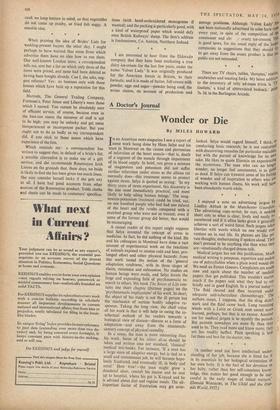A Doctor's Journal
Wonder or Die
By MILES HOWARD
TN an American news magazine I saw a report of 'some work being done by Hans Selye and his team in Montreal on the causes and prevention of infarction of the heart muscle—that is, death of a segment of the muscle through impairment of its blood supply. In brief, rats given a mixture of magnesium and potassium did not suffer cardiac infarction under stress as the albino rat normally does—this treatment seems to protect against stress. Selye is quoted as saying : 'In my thirty years of stress experiment, this discovery is the one most immediately practical, and most likely to help ailing human beings.' The mag- nesium-potassium treatment could be tried, say, on one hundred people who had had one infarct of the heart and the results compared with a matched group who were not so treated; even if some of the former group did better, that would be encouraging.
A casual reader of this report might suppose that Selye invented the concept of stress in medicine. In fact, he did nothing of the kind. He and his colleagues in Montreal have done a vast amount of experimental work on the reactions of animals exposed to intense cold and heat, pro- longed effort and other physical hazards; from this work issued the notion of the 'general adaptation syndrome,' with its three stages of alarm, resistance and exhaustion. No studies on human beings were made, and Selye leaves the large and expanding field of psychosomatic re- search to others. His book The Stress of Life con- tains one short chapter (thirteen pages) on the 'psychosomatic implications' of his work. In short, the object of his study is not the ill person but the mechanics of certain bodily adaptive re- sponses. Taking the long view, the chief value -of his work is that it will help to swing the in- tellectual outlook of his readers towards a biological view of disease—disease as a form of adaptation—and away from the nineteenth- century concept of physical causality.
In a sense, the man is more interesting than his work. Some of his °biter dicta should be taken and written into our standard, 'classical' medical text-books. For instance, 'If a man has a large store of adaptive energy, but is tied to a small and monotonous job, he will become hope- lessly frustrated, and eventually ill, in body and mind.' How true !—the man might grow a duodenal ulcer, consult his doctor and be sent up to hospital, where his gut is X-rayed and he is advised about diet and regular meals. The all- important factor of frustration may get over- looked. Selye would regard himself, I think, ns, conducting basic research; he is not concerne° with discovering remedies for particular maladies, but with the pursuit of knowledge for its own sake. He likes to quote Einstein on experiencing the mysterious. The man who can no long ,er wonder, no longer feel amazement, is as as dead. If Selye can transmit some of his feeling of wonder and of inspiration to others who are working with human illness, his work will hay° been abundantly worth while.
I enjoyed a note on advertising jargon bY Lindley Abbatt in the Manchester Guardian. The advertising copy-writer, he says, is seeking short cuts to what is clear, lively and easily re- membered and if it often lacks grace it generallY achieves a sort of weird force. Such jargon takes liberties with words which no one would ever venture on in real life. Its phrases are like Pri" vate thoughts, embarrassing if spoken aloud. They don't pretend to be anything else than what theY are—emotionally charged dream-talk. Medical jargon has not this justification. Mach medical writing is pompous, repetitive and makes use of polysyllables when a plain word would do. We need an Ernest Gowers. Complaints are mad°, now and again about the number of medical papers that get published. This wouldn't matter much if the papers said what they had to saY briefly and in good English. In a journal today-- The fluid cleared and then recurred under adequate anti-tuberculous chemotherapy.' The authors mean, I suppose, that the drug didn t work and the fluid came back. Long rumbling words with a Latin or Greek root sound more learned, perhaps, but that is no excuse. Another use for medical jargon is to mystify the patient. But patients nowadays are more fly than they used to be. They read more and know more; they are less readily baffled. Plain speaking is best for them and best for the doctor, too.
* *
'A mother need not have intellectual under- standing of her job, because she is fitted for it in its essentials by her biological orientation to her own baby. It is the fact of her devotion tO her baby, rather than her self-conscious knoW- ledge, that makes her good enough to be sue: cessful in the early stages of infant nurture. (Donald Winnicott, in The Child and the Out- side World, 1957.)


































 Previous page
Previous page